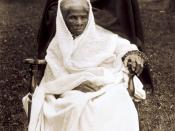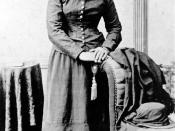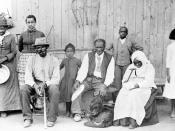Tubman, Harriet Ross (1822-1913). Born into slavery on the Eastern Shore of Maryland, Tubman gained international acclaim as an Underground Railroad operator, abolitionist, Civil War spy and nurse, suffragist, and humanitarian. After escaping from enslavement in 1849, Tubman dedicated herself to fighting for freedom, equality, and justice for the remainder of her long life, earning her the biblical name "Moses" and a place among the nation's most famous historical figures.
Originally named Araminta, or "Minty," Harriet Tubman was born in early 1822 on the plantation of Anthony Thompson, south of Madison in Dorchester County, Maryland. Tubman was the fifth of nine children of Harriet "Rit" Green and Benjamin Ross, both slaves. Edward Brodess, the stepson of Anthony Thompson, claimed ownership of Rit and her children through his mother Mary Pattison Brodess Thompson. Ben Ross, the slave of Anthony Thompson, was a timber inspector who supervised and managed a vast timbering operation on Thompson's land.
The Ross's relatively stable family life on Thompson's plantation came to abrupt end sometime in late 1823 or early 1824 when Edward Brodess took Rit and her then five children, including Tubman, to his own farm in Bucktown, a small agricultural village ten miles to the east. Brodess often hired Tubman out to temporary masters, some who were cruel and negligent, while selling other members of her family illegally to out of state buyers, permanently fracturing her family.
Working as a field hand while a young teen, Tubman was nearly killed by a blow to her head from an iron weight, thrown by an angry overseer at another fleeing slave. The severe injury left her suffering from headaches, seizures and sleeping spells that plagued her for the rest of her life. During the late 1830s and early 1840s, Tubman worked for John T. Stewart, a Madison...


